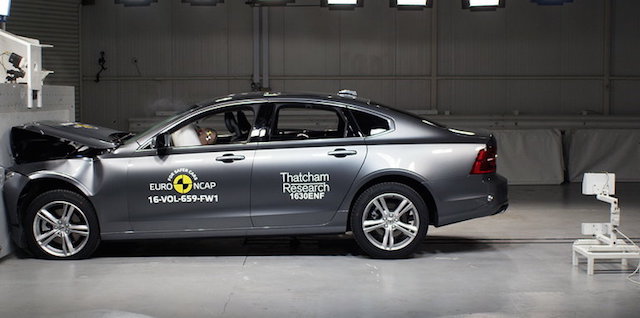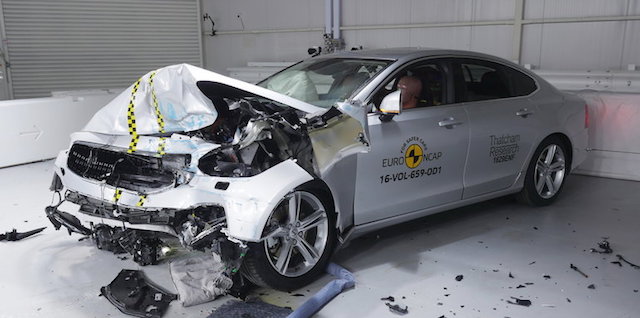
Volvo can rightfully claim that it makes the three safest cars on the planet, judging by crash test results from the European New Car Assessment Programme (EuroNCAP).
The Volvo S90 sedan and V90 station wagon have returned the highest crash safety scores ever recorded by the test body. In doing so they shaded the previous best, the Volvo XC90 SUV.
Therefore the three top crash safety scores on EuroNCAP’s books are occupied by the Chinese-owned Swedish brand.
“Volvo has invested in safety, has made key technologies standard across the model range and the results speak for themselves: a very impressive five-star rating,” said EuroNCAP secretary general, Michiel van Ratingen.
Both the S90 sedan and V90 wagon scored the maximum five stars – 95 per cent for adult occupant protection, 80 per cent for child occupant protection, 76 per cent for pedestrian protection and 93 per cent against the safety assist checklist.
The vehicle crashed in the tests was a left-hand drive S90 D4 Momentum, with the score carried across to the wagon too. EuroNCAP’s sister organisation, Melbourne-based ANCAP, is yet to transfer the result to the New Zealand and Australian markets.
Highlight of the result was a maximum six points in the autonomous emergency braking for pedestrians test (AEB Pedestrian), a first for any carmaker.
“We work hard to ensure that our cars fulfill all safety requirements and pass all testing procedures that the ratings agencies develop,” said Malin Ekholm, director of Volvo’s safety centre. “Our main focus is, and always has been, real-life safety.
“Autonomous emergency braking systems, such as our City Safety offer also represent a clear step forwards on our journey towards fully autonomous cars, which we see as a key element to reduce traffic fatalities and injuries,” Ekholm said.
Volvo’s five-star EuroNCAP result contrasts sharply with the two-star rating it gave to the Ford Mustang in pretty much the same week. Ford once owned Volvo.
It bought the Swedish company in 1999 as part of its London-based Premier Automotive Group (PAG), which included Jaguar, Aston Martin, Land Rover, and American nameplates. Over the next few years PAG came apart at the seams.
Ford sold off Jaguar and Land Rover to India’s Tata group; Aston Martin went to a Kuwait-based investment outfit with former Aston Martin chairman David Richards as its front man; and Volvo was hived off to the Chinese parent company of carmaker Geely.
Meantime, Volvo has filed trademark applications for new models in the US and Europe, among them a range of electric vehicles (EV) wearing the ‘P’ badge – P5, P6, P8, P9 P10.
Speculation is the ‘P’ badging stands for Polestar, as Volvo executives have said the next generation of the performance arm’s models will be electric or electrically assisted.
The Polestar performance brand will be retired and reinvented as an electric division. Speculation is that the ‘P’ badge could be on upcoming EV versions of current models. For example, the XC90 P8 could be the EV variant of the existing plug-in hybrid XC90 T8.

